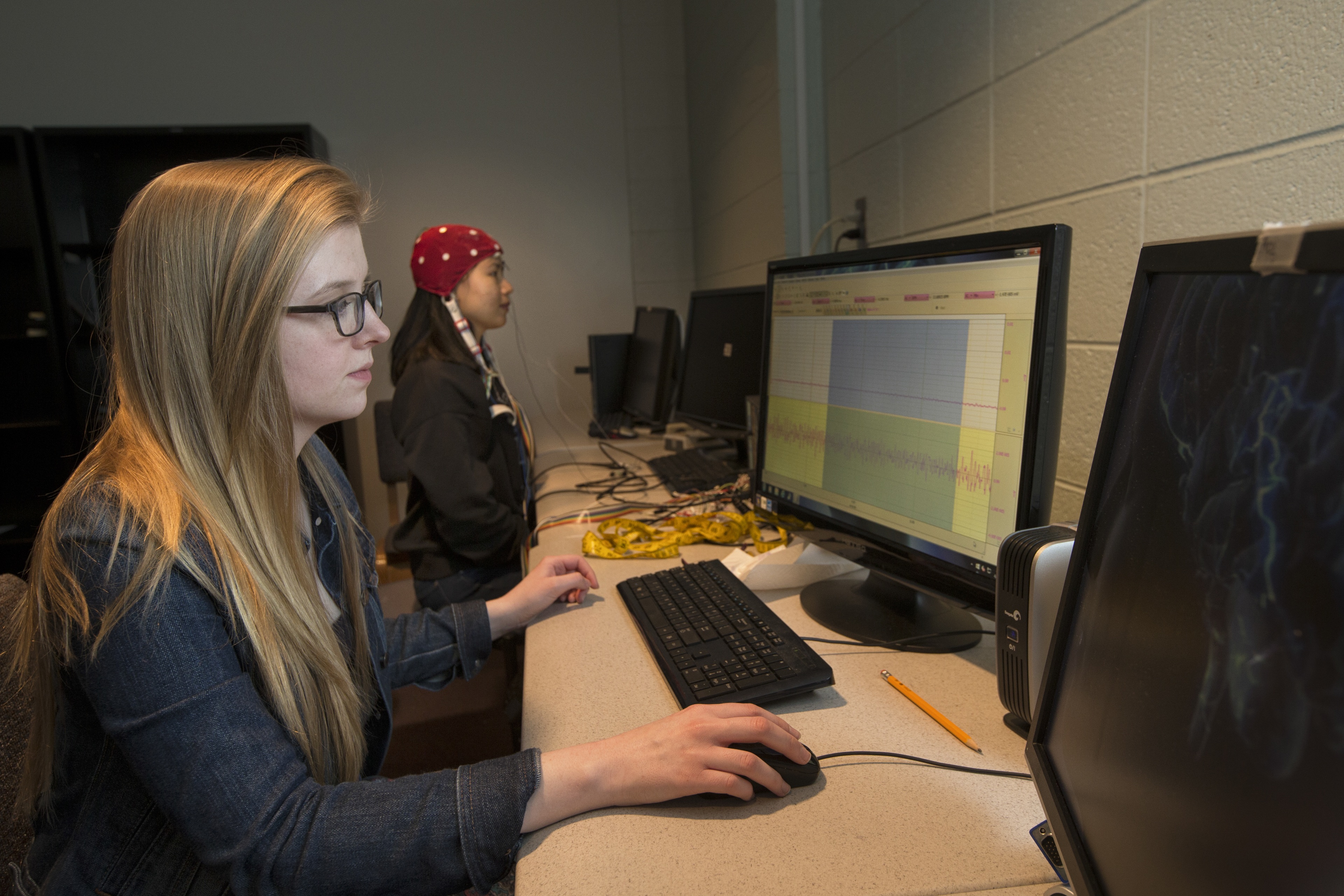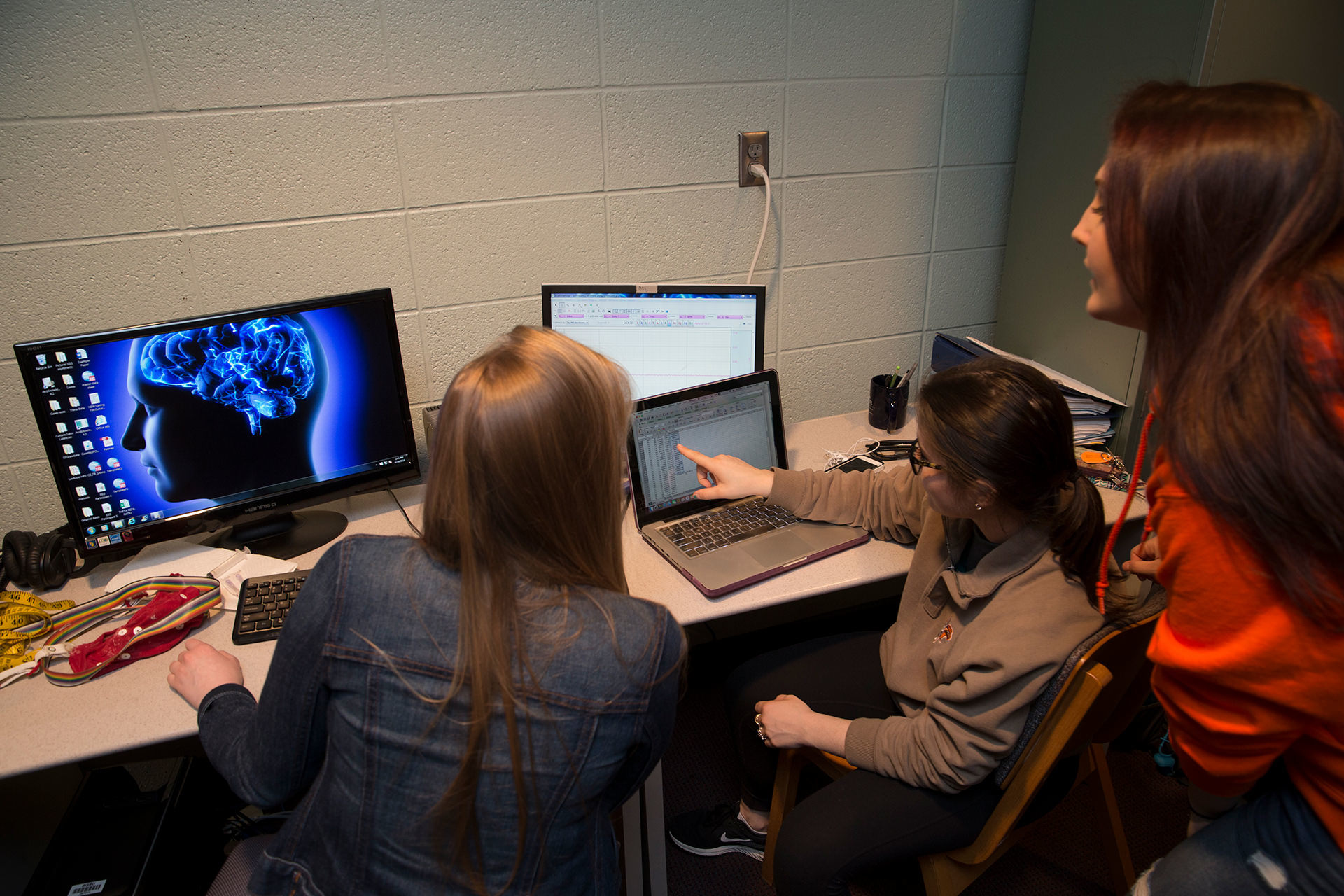
Doctorate
Psychology: Cognitive and Neural Sciences
Earn a Ph.D. in psychology with a specialization in cognitive and neural sciences from Bowling Green State University and explore the complexities of the human mind while developing innovations that reshape industries, improve lives and deepen our collective understanding of one another.
BGSU – home to one of the nation’s leading psychology research hubs – is a standout in the field of cognitive and neural psychology for its dedication to academic excellence, cross-disciplinary collaboration and student success.
The human mind is arguably the most intricate and enigmatic system in existence. In dedicating your life’s work to better understanding its function and impact on behavior, you can be a part of addressing long standing societal problems and help pioneer advancements in a broad range of fields, such as technology, healthcare and education.
- Explore treatments for people with Alzheimer’s disease.
- Enhance educational environments for neurodivergent children
- Improve human-computer interactions.
The BGSU cognitive and neural sciences Ph.D. is one of four specializations in the Ph.D. in psychology program. The others are clinical psychology, developmental psychology and industrial and organizational psychology.
Program highlights
- Combined M.A. and Ph.D. Most psychology careers require a Ph.D. BGSU students are admitted as Ph.D. candidates, but earn both their master’s and doctorate in 4-5 years.
- Strong research component. The BGSU Department of Psychology is internationally recognized as a leader in research. Students benefit from expert faculty, cutting-edge laboratories and resources – including the J.P. Scott Center for Neuroscience, Mind and Behavior, the Biology of Affect and Motivation (BAM), Developmental Neuroendocrinology, Complex Cognition and Neurobiology of Learning and Memory.
- Outstanding faculty. Our faculty are accomplished researchers and dedicated mentors. The diversity of their expertise is broad, including areas from affective neuroscience to social cognition. Students are well-supported in receiving a comprehensive education.
- Real-world experience. Land prime internships that align with your professional goals. Previous placements have included the Rand Corporation, Gallup, Proctor & Gamble, PepsiCo, Walter Reed Army Institute of Research, National Institutes for Occupational Safety and Health and Marriott.
- Collaborative and supportive community. Those working toward a Ph.D. in psychology with a neuroscience concentration join a vibrant community of scholars who share a passion for discovery and spirit of collaboration.
- Professional development. You’ll have opportunities to publish in peer-reviewed journals and present at leading conferences. Our graduates are well-prepared to make an indelible mark in the field.
The J.P. Scott Center for Neuroscience, Mind and Behavior at BGSU is a leader in the field of interdisciplinary research, with collaboration from the departments of psychology, biological sciences, chemistry, communication disorders and philosophy.
Career opportunities
A Ph.D. in psychology with a specialization in cognitive and neural sciences opens the door to a range of rewarding and high-demand careers in academia, research, clinical practice and industry innovation. Graduates have in-depth understanding of the complex connections between brain function, cognition and behavior – enabling them to address critical challenges in fields like healthcare, technology and education.
- As professors and researchers, they contribute to cutting-edge studies in neural and cognitive sciences. Institutions like the National Institute of Mental Health (NIMH) and private research organizations actively recruit neuroscience and cognitive science experts, offering roles as scientific program managers and health scientists. According to the U.S. Bureau of Labor Statistics, demand for postsecondary teachers in psychology is expected to grow 12% over the next decade.
- Career opportunities are also robust for those in clinical and applied psychology. Neuropsychologists and clinical psychologists typically work in healthcare settings, diagnosing and treating conditions such as traumatic brain injuries, cognitive impairments and neurodegenerative disorders.
- In industry, they’re hired as cognitive scientists, data analysts and human factor and engineering psychologists. They apply psychological principles to improve user experience, workplace efficiency and artificial intelligence systems.
- Pharmaceutical and biotechnology firms increasingly value professionals who can link neuroscience research to product development, offering competitive salaries and high growth potential.
Career paths
- Clinical neuropsychologist
- Research scientist
- Professor of psychology/neuroscience
- Behavioral neuroscientist
- User experience (UX) researcher
- Artificial intelligence consultant
- Human-computer interaction specialist
- Public health psychologist
- Scientific program manager
- Cognitive therapist
Quick Facts from the Bureau of Labor Statistics
Curriculum
The curriculum for the Ph.D. in psychology with a specialization in cognitive and neural sciences is carefully designed to produce leading scholar-practitioners.
This program has two primary areas of focus:
- Neuroscience. Students investigate the dynamic relationships between the nervous system, mind and behavior. Courses like Neurobiology of Learning and Memory and Developmental Neuroendocrinology provide a lens into how biological mechanisms shape cognition and emotion.
- Cognitive science and social psychology. For those captivated by higher-order cognitive processes, this focus covers visuospatial perception, judgment and social cognition. Faculty in this area direct research in the Complex Cognition Laboratory and collaborate with interdisciplinary teams from other University departments.
Research as a keystone
From day one, psychology Ph.D. candidates are encouraged to become actively immersed in research. BGSU prides itself on fostering scholars who not only consume knowledge but also generate it.
Students can engage in:
- Collaborative projects. Tackle questions about neural plasticity, affect regulation and the neurochemical foundations of learning as you work in labs such as the J.P. Scott Center for Neuroscience, Mind and Behavior.
- Independent research. Directed study opportunities allow you to dive deeply into your passions, whether exploring psychobiology or cognitive development.
- Professional presentation. Present your findings at conferences – Society for Neuroscience, the Cognitive Neuroscience Society and the American Psychological Association – to enhance your visibility and professional networks.
Culminating experience
The hallmark of the Ph.D. journey is the completion of a dissertation under the mentorship of BGSU Psychology Department faculty. These projects not only advance the field, but also positions graduates as experts ready to lead in their chosen careers.

Sample courses
- Psychometrics
- Motivation and Morale
- The Social Environment of Work
- Organizational Staffing
- Occupational Health Psychology
The doctoral program in cognitive and neural sciences is a part of the Department of Psychology in the College of Arts and Sciences.
Accreditation
The cognitive and neural sciences doctoral program, developmental psychology doctoral program and the industrial-organizational psychology doctoral program completed Program/Cluster Review during the Academic Year 2020/21.
Our doctoral program in clinical psychology has been continuously accredited by the American Psychological Association since 1971.
Bowling Green State University [BGSU] is accredited by the Higher Learning Commission. BGSU has been accredited by the Higher Learning Commission since 01/01/1916. The most recent reaffirmation of accreditation was received in 2022-2023, with our next reaffirmation of accreditation scheduled for 2032-2033. Questions should be directed to the Office of Institutional Effectiveness.
Request Information
Updated: 02/13/2025 12:47PM

